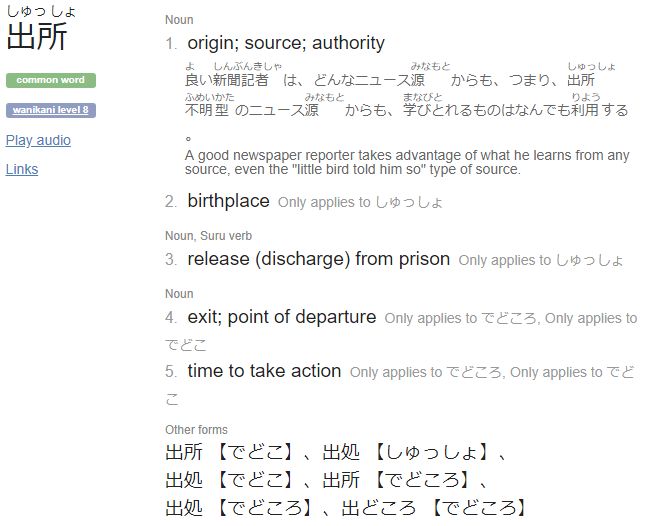Hello all, sorry if this has been posted before but I didn’t see it earlier. Also, sorry to complain, I’m loving WaniKani but I feel like the only time I post is to point out mistakes or make complaints.
Apologies out of the way, I’ve just recently run into an issue with the level 8 vocabulary word 出所. While I was reviewing this word my three Japanese coworkers expressed surprise that I was reading about prison. Apparently their first instinct with this word, read しゅっしょ, is that it’s a verb about being released/discharged from prison, typically with する at the end.
This is obviously quite different from the provided meanings of “source”, “origin”, or “place of origin”.
After much confusion it came to light that this does have a (fairly obscure) meaning of “source”, when read でどころ, which my IME confirms is a valid reading for the compound. 2/3 of my Japanese coworkers were surprised to learn that 出所 can mean “origin”, and had to look it up in a Japanese dictionary.
For reference, these are modern Japanese speakers living in the greater Tokyo region of Japan of varying ages (~20, ~30, and ~50 years old). They agree that でどころ means origin/source, and that it can be written with the same kanji. The consensus though is that the strong relation with prisons overshadows the other meaning quite heavily.
On further examination, the second provided WK example sentence for 出所 uses it as a する verb:
出所したら、ちゃんとかしをかえしてくれよな。
When you get out of the prison, please return the favor, okay?
Hopefully someone with more experience than me can chime in on whether or not this is an error and whether or not WK should instead teach the reading でどころ (or keep the current reading and change/add to the meaning). I’m by no means an expert or even a true intermediate, just going based on the very vocal reactions this word garnered in my office.
Thanks for your time.

